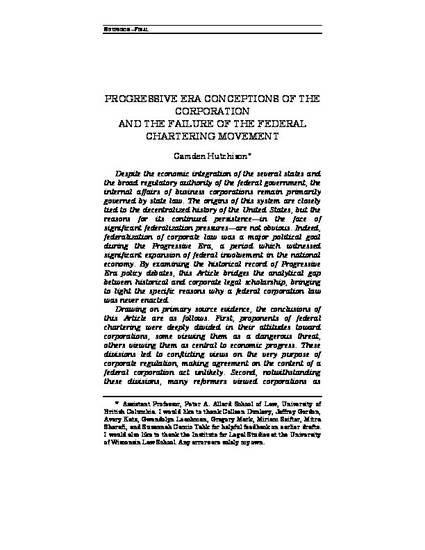
- corporations,
- federalism,
- legal history
Despite the economic integration of the several states and the broad regulatory authority of the federal government, the internal affairs of business corporations remain primarily governed by state law. The origins of this system are closely tied to the decentralized history of the United States, but the reasons for its continued persistence—in the face of significant federalization pressures—are not obvious. Indeed, federalization of corporate law was a major political goal during the Progressive Era, a period which witnessed significant expansion of federal involvement in the national economy. By examining the historical record of Progressive Era policy debates, this Article bridges the analytical gap between historical and corporate legal scholarship, bringing to light the specific reasons why a federal corporation law was never enacted.
Drawing on primary source evidence, the conclusions of this Article are as follows. First, proponents of federal chartering were deeply divided in their attitudes toward corporations, some viewing them as a dangerous threat, others viewing them as central to economic progress. These divisions led to conflicting views on the very purpose of corporate regulation, making agreement on the content of a federal corporation act unlikely. Second, notwithstanding these divisions, many reformers viewed corporations as directly accountable to the public interest. Legislative proposals were therefore framed in terms of benefiting the public, and only secondarily addressed the shareholder interests that dominate corporate law today. Finally, it was the conflicted nature of the political support for federal chartering legislation—not any specific policy preference for maintaining corporate law federalism—that led to the persistence of state-based corporate law. Ultimately, the absence of federal corporate law was a product of historical circumstance, rather than any conscious determination of legal or economic policy.
